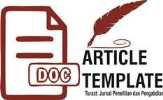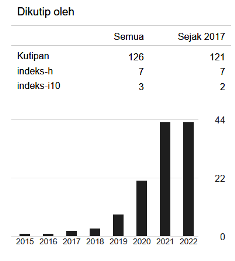PEMBERDAYAAN MASYARAKAT MELALUI MANAJEMEN ZAKAT FITRAH PADA MASA PANDEMI DI DESA MOTOLOHU KECAMATAN HELUMO KABUPATEN BOLAANG MONGONDOW SELATAN
Dian Adi Perdana
Abstract
Zakat is to purify the rights that a person has and separate the rights of others contained therein, so that it can provide benefits to others. The Indonesian government has regulated the management of zakat in UU no. 38 of 1999 about Zakat Management, regulations are made to facilitate the community in the process of collecting, managing and distributing zakat. This research discusses the management of zakat fitrah in Motolohu Village, Bolaang Mongondow Selatan Regency during the pandemic. The condition of the community is disturbed in paying zakat fitrah during the pandemic, especially in the economic sector. Researchers examined the management of zakat fitrah carried out by the government and zakat officials in Motolohu Village during the pandemic, the collection process, distribution and distribution of zakat fitrah during the pandemic, as well as the benefits of zakat fitrah for the community. This study uses a descriptive qualitative approach with various questions to the informants to get answers to social problems about community empowerment through zakat fitrah management in Motolohu Village during the pandemic. Data collection techniques used observation, interviews and documentation to several sources. The data that has been obtained are then analyzed in order to obtain the results presented in the form of conclusions. The results of research on the collection, management and distribution in Motolohu Village were carried out with different techniques. Collection of zakat, zakat administrators visit the houses of people who want to pay zakat. Zakat payments are divided into 3 levels, the process of collecting zakat is carried out optimally by paying attention to people's income. The public is advised to donate Rp. 5,000 / person. Distribution of zakat fitrah, officers distribute zakat fitrah equipped with health protective equipment. The benefits of zakat fitrah that are obtained by muzakki in Motolohu Village are the implementation of amaliyah which can still be applied by giving to those who have the right, especially in a pandemic situation.
Keywords
Community Empowerment, Zakat Management, Zakat Fitrah

DOI:
https://doi.org/10.15548/turast.v9i2.2760

Abstract views : 380 times

PDF : 352 times
References
Abadi, Khafid. 2020. “HUKUM TA’JIL AZ-ZAKAH KARENA ADANYA PANDEMI COVID-19.” Ar-Risalah: Jurnal Keislaman, Pendidikan Dan Hukum Islam 18, no. 2: 193–206. https://doi.org/https://doi.org/10.29062/arrisalah.v18i2.390.
Arikunto, Suharsimi. 2014. Prosedur Penelitian: Suatu Pendekatan Penelitian. Rineka Cipta.
Fitri, Maltuf. 2017. “Pengelolaan Zakat Produktif Sebagai Instrumen Peningkatan Kesejahteraan Umat.” Economica: Jurnal Ekonomi Islam. https://doi.org/10.21580/economica.2017.8.1.1830.
Gurning, H., and H. Ritonga. 2015. “ANALISIS TINGKAT KESADARAN MASYARAKAT KECAMATAN MEDAN BARU DALAM MEMBAYAR ZAKAT.” Jurnal Ekonomi Dan Keuangan.
Kadir, Afifuddin, Miftahur Rahman Hakim, Fahmi Syam, and Murdiansah SA Karim. 2020. “PENGUNAAN DANA ZAKAT PADA KORBAN COVID-19 PERSPEKTIF MAQASHID SYARIAH.” Al-Tafaqquh: Journal of Islamic Law. https://doi.org/10.33096/al-tafaqquh.v1i2.61.
Lapopo, Jumadin. 2017. “PENGARUH ZIS (ZAKAT, INFAK, SEDEKAH) DAN ZAKAT FITRAH TERHADAP PENURUNAN KEMISKINAN DI INDONESIA PERIODE 1998 - 2010.” Media Ekonomi. https://doi.org/10.25105/me.v20i1.779.
Mubarok, Abdulloh, and Baihaqi Fanani. 2014. “PENGHIMPUNAN DANA ZAKAT NASIONAL (Potensi, Realisasi Dan Peran Penting Organisasi Pengelola Zakat).” Permana.
Qardawi, Yusuf. 1999. “Hukum Zakat.” Mizan, Bandung.
Saputra, Hijrah. 2020. “ZAKAT SEBAGAI SARANA BANTUAN BAGI MASYARAKAT BERDAMPAK COVID-19.” Al-Ijtima`i: International Journal of Government and Social Science. https://doi.org/10.22373/jai.v5i2.549.
Refbacks
- There are currently no refbacks.
Copyright (c) 2021 Turast : Jurnal Penelitian dan Pengabdian

This work is licensed under a
Creative Commons Attribution-ShareAlike 4.0 International License.

This work is licensed under a Creative Commons Attribution-ShareAlike 4.0 International License
Editorial Office
Turast: Jurnal Penelitian dan Pengabdian
Copyright©. Pusat Penelitian dan Publikasi Ilmiah
Lembaga Penelitian dan Pengabdian (LPPM), Gedung Rektorat Lantai I
Kampus III Universitas Islam Negeri Imam Bonjol Padang - All rights reserved
Email: turast@uinib.ac.id





